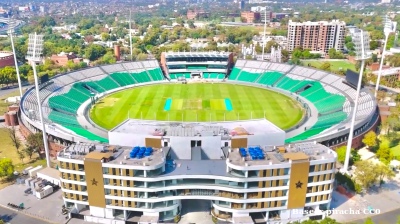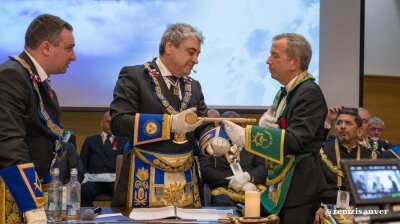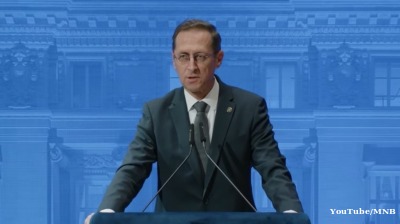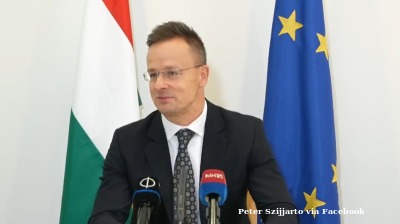The ambassadors of Nato member states and Sweden's ambassador to Budapest met on October 19 to discuss "Hungary's deepening relationship with Russia" in light of the recent meeting between Hungarian Prime Minister Viktor Orban and Russian President Vladimir Putin in Beijing.
US Ambassador David Pressman said it was important to meet with the US's Nato allies because "we are all concerned about the meeting at a time when Russia is at war with Ukraine as an aggressor".
"It is worrisome that Hungary has chosen to engage with Putin in this way. As is the language used by the prime minister to describe Putin's war in Ukraine. Both of these needed to be discussed," he said, referring to Orban calling the aggression a "military operation," the term used in Russia for the war.
"If we have legitimate security concerns, we take these to our allies and we expect them to be taken seriously," he said in the exclusive interview with Radio Free Europe, whose Hungarian service was revived in September 2020 after 27 years in view of the deteriorating media landscape in Hungary.
The meeting in Beijing showed that Hungary’s radical right-wing leader continues to defy alignment with the Nato and EU position at a time of growing geopolitical tensions, which could trigger a response, pundits noted. Hungary is the only EU country that continues to meet Russian leaders.
Nato members have grown weary of Budapest betraying its allies, which is increasingly seen as a security risk, writers of independent blogs opined.
This could be the last warning to Orban who has cosied up to Russia, and blocked EU support to Ukraine.
Pressman swiftly reacted to Orban's meeting, tweeting: "Hungary’s leader chooses to stand with a man whose forces are responsible for crimes against humanity in Ukraine, and alone among our Allies. While Russia strikes Ukrainian civilians, Hungary pleads for business deals."
Germany's ambassador to Budapest Julia Gross commented similarly, saying that while Russia is attacking Ukrainian civilians, Hungary is begging for a deal.
Hungary intends to maintain cooperation with Russia in any and all areas that can be salvaged from the sanctions, Foreign Minister Peter Szijjarto told reporters earlier this week in Beijing after the Orban-Putin meeting. Hungary is one of the most dependent countries in the EU on Russian energy and despite pledges from officials it has done little to lessen that reliance.
Earlier this month, leaked reports suggested the US is planning to introduce sanctions against Hungarian individuals, possibly those close to the Hungarian PM.
In August, the United States restricted visa waivers for Hungarian passport holders and a year earlier it cancelled the double taxation agreement in view of Budapest’s opposition to the global minimum tax treaty, piloted by the OECD, which set a 15% corporate tax rate for multinational companies with €750mn annual revenue. Since then, Hungary has agreed to back the initiative, but Washington’s position on the tax agreement remained unchanged.
The fact that the Swedish ambassador was also invited to the close-door meeting sent the message to the Orban government that Nato considers Sweden a full member, regardless of the Hungarian failure to ratify its accession.
Hungary remains the only EU member state not to have ratified Sweden's accession yet, and the issue is not on the agenda of parliament’s autumn session.
In the meantime, a 40-second video of Orban-Putin meeting on social media, shot by Putin teams, shows the Hungarian leader looking unfocused and distressed. Prior to the meeting, he looked confident, but images show him nervously rearranging his papers, fussing around, touching his pen and his suit, and making uncontrolled movements. Some critics noted that Orban may have been confronted with negative news, while others have raised questions over Orban's physical and mental ability to carry on as prime minister.
News

Taiwan confirms first African swine fever outbreak
Authorities detected the virus on a pig farm in Wuqi District, Taichung, after 117 pigs died between October 10 and 20.

Afghanistan withdraws from Pakistan tri-nation T20 to protest murder of three local cricketers
The Afghanistan Cricket Board says it has secured clear video footage implicating the Pakistan state in an attack that killed three local cricketers.

Sanae Takaichi makes history as Japan’s first female prime minister
In her first press briefing as leader, the 64-year-old pledged to drive reform with confidence and determination, describing her administration as one “ready to decide and move forward.”

White House halts plans for Trump-Putin summit in Budapest
Anonymous White House official tells AFP there are “no plans” for Trump to meet Putin “in the immediate future”, effectively shelving a Budapest gathering that Trump had described as imminent only days earlier.




